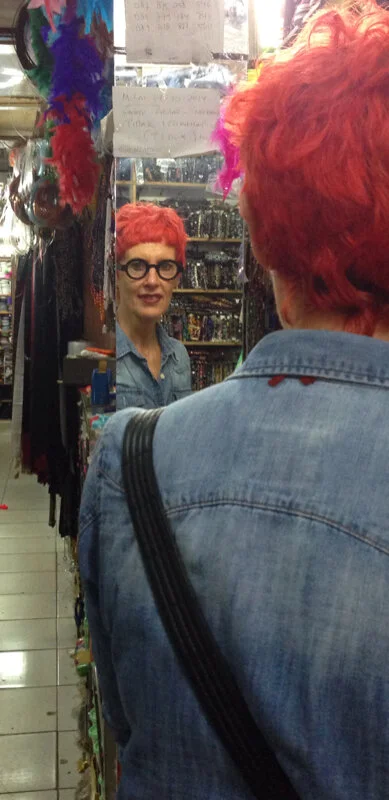Ibu Hani Nandana
Ibu Hani Nandana is my Bahasa Indonesia teacher and I have been her student for the past 10 months. I recall meeting her for the first time; a gently-spoken woman who as it turns out has a very big laugh. I would come to enjoy her energy frequently as our conversation would often be punctuated with moments of humour. Also, I soon learned that Ibu Hani lived a good proportion of her life overseas and had experienced far more of this world than I. I learnt this not because she was boastful about the richness of her life's journey, but because over the course of our numerous lessons, this information was received through the sharing of conversation and anecdotes.
As our lessons progressed, I found my proficiency of the language improved far quicker than I had expected (a combination of being taught by a superb teacher and hearing Bahasa spoken every day). Moreover, Ibu Hani instilled a curiosity in me about the culture and people of this wonderfully diverse country. My desire to learn more became ignited. Although it is difficult to short-list what I admire most about Ibu Hani, one of her traits that I respect greatly is her genuine love of humanity. She is grateful for the life that she has lived and she has remaind open-minded and contemporary in her outlook on life. I've also learnt that Ibu Hani does not tolerate fools. I admire this.
To meet such an inspiring person so early in my arrival has been incredibly uplifting and rewarding. Spending time with Ibu Hani has confirmed the importance of surrounding myself with positive people. Not only has she given me the gift of another language, but she has become a wonderful friend.
*Kenalkan Ibu Hani Nandana
Where did you grow up?
As my father was a diplomat I was fortunate to have had the opportunity to grow up in several countries such as India (Calcutta), Suriname (Paramaribo), Italy (Rome), U.S.A (Buffalo/N.Y) and Austria (Vienna).
Ibu Hani pictured here as a fourteen year old living with her family in Rome, Italy. This image was taken at a fashion parade featuring modern-style dresses made with batik fabric
Your memories of early childhood in Jakarta
As I was born and lived most of my childhood life in Bogor, I only visited Jakarta on some occasions. At that time Jakarta was not crowded or polluted. In fact, there were still boats in the canals at Central Jakarta - a lovely scenery similar to that of Amsterdam.
What was life like as an expat child living in India?
As a child of an expat there were a lot of privileges which many children did not experience. In 1952-1953 I lived in Calcutta. Our house had 5 bedrooms. We had many household staff including a cook, a sweeper (who only swept and washed the floors), a maid who did the washing and ironing, a butler (they call him a "bearer"), a guard and a driver. As my parents were not aware that we would be provided with so many household staff, we took a helper from Indonesia with us. However, despite all the luxury of having so many household staff, my parents made sure that we, as children, led a normal life and had to take part in the household like all other children.
When we arrived in Calcutta, being unaware that India was a British colony, I was very impressed by how well English was spoken by practically everyone, even the people on the streets, whilst in Indonesia the only foreign language spoken was Dutch (and only by intellectuals).
3 lessons learnt during your childhood that you still live by
Proficiency of foreign languages is without a doubt an asset as it bring opportunities in the workplace.
Appreciate the culture of every country – one can learn a lot from it.
I don’t believe in discrimination of gender which was common in my country at that time.
You have seen a lot of change in Indonesia throughout your life time. What is your feeling about the future of this diverse, colourful nation, especially under the leadership of new Indonesian President, Mr Joko Widodo?
I consider Indonesia a young nation with opportunities, particularly as it possesses a lot of natural resources. I believe in the new leader as he is a “people’s” person who went through hardship and poverty himself as a young child, thus he understands the basic needs of the people.
What inspires/excites you?
Reading about the philosophy of life and also about people who made history in their lives. I am very much inspired by Mother Teresa, Martin Luther King and the Dalai Lama.
What angers/frustrates you?
Abuse of power - people abusing the less fortunate/less educated people. Also, I cannot tolerate hypocrisy and insincerity.
Top 3 pieces of advice for someone new to Jakarta
Learn the language
Observe and accept the culture
Mingle with the locals
Where to take visitors in Jakarta
Situ Babakan – a Kampung Betawi (Betawi people originated from Jakarta)
Gemstone market in Jatinegara
Cinangneng - located a bit outside of Bogor. One can plant rice in the paddy fields and wash buffaloes in the river. There is some home industry with the locals making bags/rucksacks and items made from coconut shells. Such a trip cannot be undertaken on your own; it has to be organised by a travel agent.
Whilst living in Indonesia, 3 things someone should experience
Idul Fitr - not so much the celebration but more the custom ie, how all muslims of all generations (old/young/kids) gather in their religious attire to do the Idul Fitr prayer. They gather together in mosques and even on the streets, lead by an Imam, during which time there is complete silence.
How Chinese New Year is celebrated – this is mainly in the centre of Jakarta.
Nyepi in Bali - a day of silence when people do not speak to one another. There is no noise and no lights at night for the entire 24 hours. People still carry on with their lives but all in silence. The hotels run normally but there are no evening programmes.
Your favourite place to visit within Indonesia
Bandung – the weather is pleasant and cool. One can see many houses dating back to the Dutch period. The landscape is also very hilly.
Favourite place abroad
Rome, Italy .......Viva Italia!
My family photo
The family photo supplied by Ibu Hani features four generations of her family; her mother Ibu Mariati, Ibu Hani, Ibu Hani's daughter Ibu Miranda and granddaughter Shamara. Ibu Mariati passed away in 2013, 3 weeks shy of her 96th birthday.
In any country it is relatively unusual to have four generations alive at the one time, and especially so in Indonesia where the average life expectancy for a female is around 71 years. When asked about this, Hani speculated that perhaps the longevity and good health bestowed upon her family could be partially attributed to their consumption of Jamu (refer to our story on Jamu in our Food section). Ibu Hani explains, 'during my childhood, once a girl started menstruation, they were made to drink Jamu regularly; in fact even my daughter still remembers her 'Jamu days'. At that time it was a home-made product made with all sorts of herbs and roots. It tasted awful! I felt tortured each time I had to drink it. But looking at the photo of the four generations of our family, maybe there was some health benefits after all'.
*Kenalkan: let me introduce
Words: Jo Stevens Photography: Hani Nandana






